⚡ Quick Summary
This research introduces a model-free ultra-local model (MFULM) controller that employs multi-agent on-policy reinforcement learning (MAOPRL) to effectively regulate blood pressure through precise drug dosing in a closed-loop system. The findings demonstrate the controller’s adaptability and stability, making it a promising advancement in blood pressure management.
🔍 Key Details
- 📊 System Components: MFULM controller, observer, and MAOPRL algorithm
- ⚙️ Technology: Multi-agent on-policy reinforcement learning
- 🏆 Performance Metrics: Evaluated under normal conditions, adaptability, and stability against disturbances
🔑 Key Takeaways
- 🤖 Innovative Approach: The MFULM controller adapts drug dosages and blood pressure control parameters dynamically.
- 💡 Enhanced Stability: Incorporating an observer improves performance by estimating states and disturbances.
- 🏥 Clinical Relevance: The method shows promise for personalized blood pressure management across different patients.
- 📈 Adaptive Learning: The actor-critic approach allows for real-time adjustments based on feedback.
- 🌍 Broad Applications: Potential for use in various healthcare settings requiring precise blood pressure control.
- 🔬 Research Validation: Evaluations confirm the efficiency and viability of the proposed method.

📚 Background
Blood pressure regulation is crucial for preventing cardiovascular diseases, yet traditional methods often lack the adaptability needed for individual patient care. The integration of advanced technologies such as reinforcement learning offers a new avenue for enhancing the precision and effectiveness of blood pressure management systems.
🗒️ Study
The study developed a closed-loop system featuring a model-free ultra-local model (MFULM) controller, which utilizes a multi-agent on-policy reinforcement learning (MAOPRL) technique. This innovative approach aims to optimize blood pressure control through precise drug dosing, enhancing both adaptability and stability in patient care.
📈 Results
The evaluations conducted under various conditions demonstrated that the MFULM controller effectively adapts to disturbances and maintains stable blood pressure levels. The incorporation of the observer significantly improved the controller’s performance, showcasing the potential of the MAOPRL approach in real-world applications.
🌍 Impact and Implications
The findings from this study could lead to a paradigm shift in how blood pressure is managed in clinical settings. By leveraging adaptive learning techniques, healthcare providers can offer more personalized treatment plans, ultimately improving patient outcomes and reducing the risks associated with hypertension.
🔮 Conclusion
This research highlights the transformative potential of reinforcement learning in healthcare, particularly in the realm of blood pressure management. The MFULM controller represents a significant step forward, paving the way for more adaptive and effective treatment strategies. Continued exploration in this field is essential for realizing the full benefits of these technologies in clinical practice.
💬 Your comments
What are your thoughts on the use of reinforcement learning for blood pressure management? We would love to hear your insights! 💬 Join the conversation in the comments below or connect with us on social media:
Adaptive average arterial pressure control by multi-agent on-policy reinforcement learning.
Abstract
The current research introduces a model-free ultra-local model (MFULM) controller that utilizes the multi-agent on-policy reinforcement learning (MAOPRL) technique for remotely regulating blood pressure through precise drug dosing in a closed-loop system. Within the closed-loop system, there exists a MFULM controller, an observer, and an intelligent MAOPRL algorithm. Initially, a flexible MFULM controller is created to make adjustments to blood pressure and medication dosages. Following this, an observer is incorporated into the main controller to improve performance and stability by estimating states and disturbances. The controller parameters are optimized using MAOPRL in an adaptive manner, which involves the use of an actor-critic approach in an adaptive fashion. This approach enhances the adaptability of the controller by allowing for dynamic modifications to dosage and blood pressure control parameters. In the presence of disturbances or instabilities, the critic’s feedback aids the actor in adjusting actions to reduce their impact, utilizing a complementary strategy to tackle deficiencies in the primary controller. Lastly, various evaluations, including assessments under normal conditions, adaptability between patients, and stability evaluations against mixed disturbances, have been carried out to confirm the efficiency and viability of the proposed method.
Author: [‘Hong X’, ‘Ayadi W’, ‘Alattas KA’, ‘Mohammadzadeh A’, ‘Salimi M’, ‘Zhang C’]
Journal: Sci Rep
Citation: Hong X, et al. Adaptive average arterial pressure control by multi-agent on-policy reinforcement learning. Adaptive average arterial pressure control by multi-agent on-policy reinforcement learning. 2025; 15:679. doi: 10.1038/s41598-024-84791-5